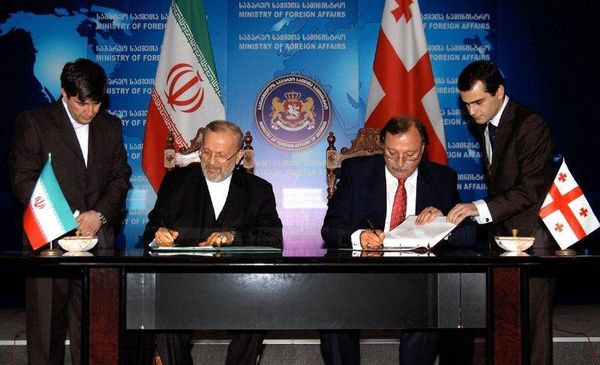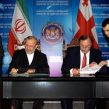
Georgian Government Revokes Visa-Free Travel Rules with Iran
Publication: Eurasia Daily Monitor Volume: 10 Issue: 126
By:

On July 1, the Georgian government unilaterally revoked the 45-day visa-free travel rules with Iran (www.iveroni.com.ge, July 3). Georgia implemented a visa-free regime with Iran in January 2011, under President Mikheil Saakashvili’s administration. Although, the step increased the number of Iranian visitors in Georgia from about 21,000 in 2010 to about 90,000 in 2012 (www.civil.ge, July 2), many criticized Saakashvili for risking worsening relations with Georgia’s longest and closest ally, the United States, which kept a watchful eye on Georgia’s enforcement of the United Nations Security Council–imposed sanctions on Tehran. As Iran expanded its economic presence in Georgia, Washington watched with alarm, fearing that Tehran was using Georgia to evade economic sanctions.
However, the question remains: why has Georgia revoked the visa-free rules now? Some earlier developments shed light on this question. The revocation was preceded by a lengthy, critical article in the Wall Street Journal (WSJ) on June 20. The article expressed concerns about the expansion of Iranian trade, investments, and businesses in airline, banking, agriculture, construction materials and other sectors of the Georgian economy. According to the WSJ, the number of companies in Georgia registered by Iranians increased from 84 in 2010 to 1,489 in 2012. The newspaper also claimed that Iran’s Revolutionary Guard had 150 front companies in Georgia to evade sanctions, import dual-use technologies, and make financial and, as many fear, illicit financial transactions. The WSJ even quoted an Iranian residing in Tbilisi who stated that Georgia has become a key place, particularly in the banking sector, to evade sanctions.
The Georgian Justice Minister Tea Tsulukiani quickly responded, stating that current and previous governments strictly monitored and are monitoring Iranian businesses in the country and rigorously enforce sanctions. In fact, Georgia froze about 150 bank accounts of Iranian individuals and legal entities. For strictly enforcing these sanctions, the country even received a highly positive assessment from a visiting UN panel of experts, who were gathering and analyzing information on the proper enforcement of the sanctions against Iran in Georgia (www.ttimes.ge, June 23).
The aforementioned June 20 WSJ article also partially blamed new Georgian Prime Minister Bidzina Ivanishvili’s more independent and less pro-American stance (than that of President Saakashvili’s) for Tbilisi’s closer ties with Tehran. However, the United States Embassy in Georgia quickly stepped in to defend the Georgian government, stating that US concerns about the evasion of sanctions by Iran in Georgia had been growing over the past few years and pre-date the current Georgian government (www.civil.ge, June 21).
In another related event, on June 24–25, Ivanishvili visited Israel to hold formal talks with Israel’s Prime Minister Benjamin Netanyahu, with the aim of deepening bilateral ties. Right before the meeting, Netanyahu stated that he looked forward to discussions with his Georgian counterpart about challenges coming from Iran, apparently partially alluding to Iran’s expanding economic presence in Georgia (www.civil.ge, June 25). Later Ivanishvili hailed his visit to Israel as the most successful among all his other foreign visits (www.netgazeti.ge, June 26).
Clearly, by revoking its visa-free-travel arrangement with Iran, the Georgian government was acting under pressure from both the US and Israel. However, the question now is where this whole affair leaves Georgia. Although, Prime Minister Ivanishvili declared that Georgia would continue to maintain good neighborly relations with Iran, while also continuing to observe sanctions (www.interpressnews.ge, July 7), it is not clear if Tbilisi will be able to uphold this balancing act. On July 3, senior Iranian Member of Parliament (MP) Alaeddin Boroujerdi, who chairs the Iranian legislature’s foreign affairs and national security committee, criticized Georgia for revoking the visa rules, reprimanding it for disrespecting its own signature on the agreement (www.civil.ge, July 3). Soon after, another senior Iranian MP, Mansour Haqiqatpour, criticized Tbilisi, stating that revoking the visa-free rules will negatively affect bilateral relations. According to Haqiqatpour, Georgia is simply trying to please its Western and US “masters” to gain something in return (www.radiotavisupleba.ge, July 7).
Georgia is once again reaping the bitter results of living in a highly volatile geopolitical region where vital interests of the great powers are clashing. It is highly likely that Georgian-Iranian ties will suffer, at least in the short term. Another concern is whether just a revocation of the visa-free rules will halt Iran’s unprecedented economic expansion in Georgia. After all, it is not entirely clear whether the visa-free rules were a cause or simply a side effect of Iran’s increased economic activities in Georgia. Moreover, Tbilisi will still have to find ways to effectively monitor almost 1,500 Iranian companies that sprang up in Georgia since 2010 as a result of Saakashvili’s policy of closer economic ties with Iran. And yet another worry is how Tehran will now retaliate, not least in regards to Georgia’s breakaway regions of Abkhazia and South Ossetia. As these recent events illustrate, every foreign policy step of a small country as fragile as Georgia is filled with risk and danger.




